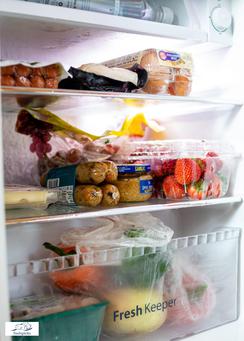What to do when your fridge smells like dead animal? Are you a victim of a smelly refrigerator? Well, if you do not know already, the culprit is most likely to be that dead animal you accidentally stored in there.
While it can certainly seem like a challenge to remove the odor from your fridge and prevent it from happening again, luckily there are some simple steps you can take to keep your appliance smelling good for years to come.
Read below to find out how to clean your fridge and prevent odors from forming in the future.
What Makes The Fridge To Smell?
The first thing you need to understand is what makes your fridge smell in the first place. In most cases, it is because of food spoilage. When food starts to rot, it emits gases that contain sulfur. These gases are what give the fridge its characteristic stench.
Another common cause of a smelly fridge is mold and mildew. These fungi thrive in moist and dark environments, which makes your fridge the perfect breeding ground for them. If left unchecked, mold and mildew can quickly take over your appliance and make it impossible to use.
Finally, another common cause of fridge odors is leaking. If your fridge is leaking water or other liquids, it can create the perfect environment for bacteria to grow. These bacteria can produce foul-smelling gases that will make your fridge stink.
How To Clean A Smelly Fridge
Lower the Temperature
One of the easiest ways to prevent your fridge from smelling is to keep it at a lower temperature. Bacteria and fungi thrive in warm environments, so by keeping your fridge cool, you can make it less hospitable for them to grow.
You should aim to keep your fridge between 35 and 40 degrees Fahrenheit. Any warmer than that and you run the risk of food spoilage and bacteria growth.
Clean The Interior
The next step is to clean the interior of your fridge. Start by removing all of the food and any loose dirt or debris. Once the fridge is empty, you can wipe down the shelves and walls with a mild soap and water solution.
Be sure to pay attention to any spots where mold or bacteria could be growing, such as on the door gasket or the backs of shelves. If you find any suspicious growths, use a stronger cleanser like vinegar to get rid of them.
Clean The Exterior
Once your interior is clean and dry, it is time to clean the exterior. Start by wiping down the outside of your fridge with a damp cloth. If there are any tough stains, you can use a mild abrasive cleaner to remove them.
Refrigerators Condenser Coils
Next, clean the fridge coils. These are located on the back or bottom of your appliance and can be easily accessed for cleaning. Simply vacuum or brush away any dirt or debris from the coils to prevent them from overheating.
Get Rid Of Leaks
Finally, check your fridge for leaks and make any necessary repairs. A leaking appliance is a breeding ground for bacteria, so it is important to fix any leaks as soon as possible.
How Soon Should You Deep Clean Your Refrigerator?
After going through the cleaning process outlined above, you should deep clean your fridge every three to six months. This will help to prevent any build-up of odors and keep your appliance looking and smelling its best.
In between deep cleanings, you should also do a quick cleaning of your fridge every week. This involves wiping down the shelves and walls, as well as cleaning the coils and gasket.
Can You Use Bleach To Clean a Refrigerator?
Yes, you can use bleach to clean your fridge. However, it is important to dilute the bleach before using it. Mix one tablespoon of bleach with one gallon of water and use this solution to clean all surfaces inside your fridge.
Make sure you open the door and ventilate the area while you are cleaning to prevent the fumes from bleach from building up. When you are done, be sure to wash your hands thoroughly and dispose of the cleaning solution in a safe and appropriate manner.
How to Clean a Refrigerator with Rotten Food
If your fridge is full of rotten food, the first step is to remove all of the spoiled items. Once you have done this, you can clean the interior of your appliance with a mild soap and water solution.
For tougher stains, you may need to use a stronger cleaner like vinegar or bleach. Be sure to dilute any bleach or other cleaning solutions before using them, and always wear gloves when handling these products.
Once your fridge is clean and dry, you can move on to addressing any leaks or damaged parts. This may involve replacing the seals on the door or doing some minor repairs to the condenser coils.
What to Put in the Fridge to Stop it From Smelling?
There are a few things you can put in your fridge to help stop it from smelling. One option is to place an open box of baking soda inside. This will absorb any odors that may be present.
You can also try placing a bowl of vinegar or lemon juice inside your fridge. These substances will help to neutralize any bad odors, leaving your appliance smelling fresh and clean.
Another option is to place some herbs or spices inside your fridges, such as cinnamon sticks, cloves, or allspice. These natural fragrances will help to keep your fridge smelling fresh and pleasant. Finally, you can try using activated charcoal or activated carbon packets to absorb odors.
Wrapping Up
Deep cleaning your refrigerator is an important part of maintaining a clean and healthy kitchen. By following the steps outlined above, you can easily keep your fridge smelling fresh and looking its best.
Don’t forget to schedule regular deep cleanings every three to six months, and be sure to do a quick cleaning of your fridge every week. This will help to prevent any build-up of dirt and debris, and keep your appliance running smoothly



